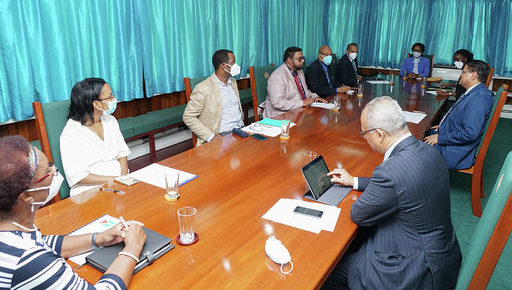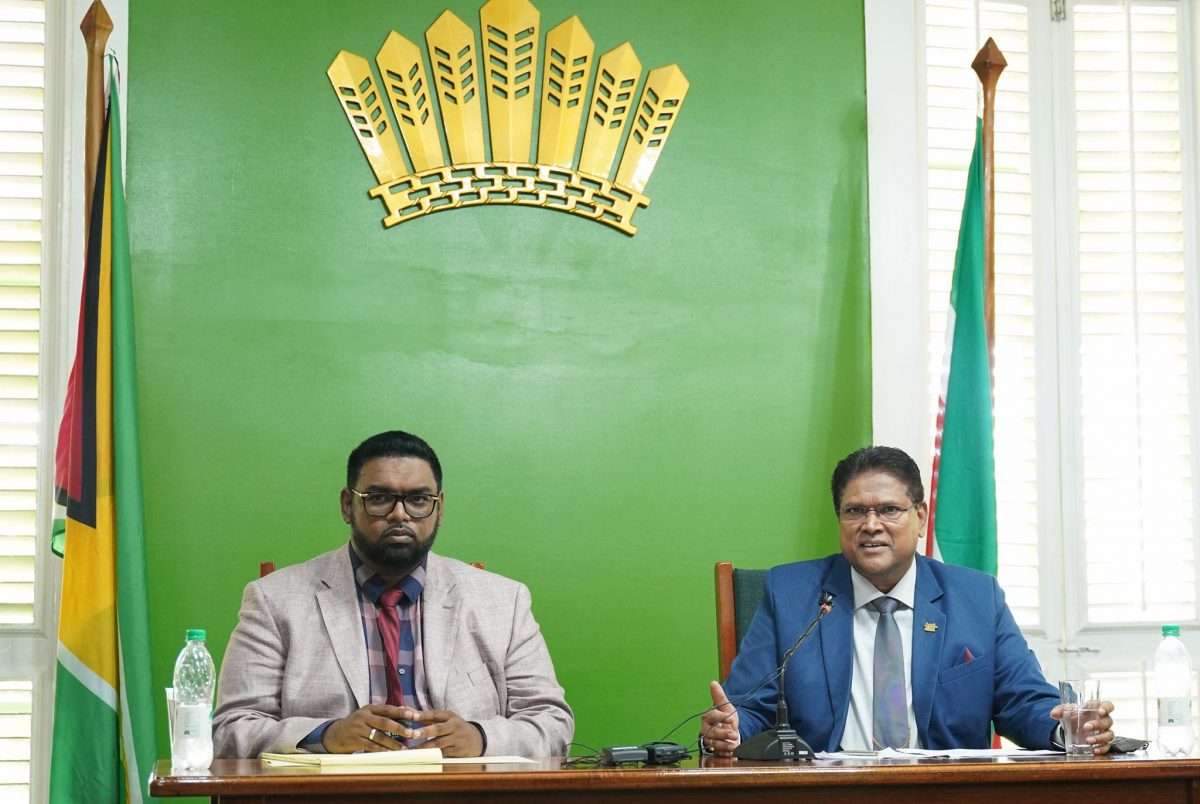Bilateral co-operation between Georgetown and Paramaribo was over the weekend agreed when two recently-elected presidents – Guyana’s Irfaan Ali and Suriname’s Chandrika-persad Santokhi – held discussions on oil and gas and a bridge across the Corentyne among other areas.
With Suriname experienced in the oil sector, President Ali said that Guyana and its private sector could learn a lot, especially in the area of local content, from its neighbour to the East. And like Guyana, Suriname currently has a number of ongoing oil and gas explorations which are near to this country’s basin.
“This co-operation will not be government to government cooperation. Government should facilitate and they should facilitate the private sector, so there will be an increased private sector (input) between the two countries,” Santokhi yesterday told a press conference which was held at State House.

With the Presidents leading their respective delegations, the names of teams of persons from both countries that will form the Guyana/Suriname development group have already been selected and Ali promised that citizens would see fast action. He said that evidence of his promise could be seen as a timeframe of early September has already been designated for the first draft of proposals to be made and then the team will meet in Paramaribo, at a date to be set, in October.
‘Timetable of action’
The press conference was held yesterday following a meeting by the two leaders with Guyana’s private sector at which foreign diplomats resident here were also present.
Ali explained that both governments plan to have meetings between the nations’ private sectors and they will also be part of a committee to help plan developmental projects.
“We’re setting up a working committee at the policy level and at the technical level, not only to advance discussions but to come out with a timetable of actions for the implementation,” Ali said.
Santokhi explained that working relations exist on a number of levels and with CARICOM and the support of the international community, there is much both countries could do to help set the development agenda of the region.
Both leaders believe that when synergies fuse and they have a sound bilateral plan, they can take those proposals to multinational organisations and businesses to secure funding.
“We’ve both stressed the need to have timeline objectives, so we have laid the framework that would enable us to make use of the opportunities… to confront the challenges, that would define the way we approach international partners, international financial institutions, for the raising of capital,” he said.
For Santokhi, both leaders have to work hard to make their cooperation plans a reality.
“…(there) will be cooperation on a community level. There is a large Guyanese community in Suriname which is integrated and there are a lot of Surinamese companies in Guyana now. Those things are the examples. Those are the key elements on how we should build further. Now (there will be ) more energy by including all the sectors. We will cooperate and will deepen, expand …based on mutual respect and understanding and we will formalize that in a formal agreement, which will be signed in a timeline set out,” he said.
There are already some targets identified as both Ali and Santokhi said that they do not want their meetings to be all theory and no reality and languish for long periods. “We are not talking about months, we are talking about weeks in which we have to achieve the agreement,” Santokhi said about the signing.
“The cooperation will be regionally. We are two leaders of two countries belonging to the Caricom community…we have a lot of challenges and a lot of resources. We see a bright future for our people and we want to invest in sharing information,” he added.
Wealth of experience
The Surinamese leader says he also wants to share his wealth of experience in the area of security with this country, as they both tackle issues of piracy, smuggling, border surveillance and cybercrime.
After the Presidents spoke, they gave both of their foreign ministers the opportunity to elaborate on plans.
It is to this end that newly appointed Minister of Foreign Affairs Hugh Todd underscored the need for infrastructural developments here and played up the importance of resuscitating dialogue in building a bridge over the Corentyne to connect the two countries. “It [the bridge] will add a lot of value, in terms of our economic efficiency and allow costs to go down, especially in terms of that link. So that is something that we will work assiduously to ensure that we can get that project to a reality,” he said.
Food security will also take precedence as Todd said the focus will be “heavily on agriculture” as that is “the bedrock of our economies”. And with plans for the private sector, he stressed the importance of a manufacturing opportunity and the lands this country has to make that reality. “We have to get our private sector involved because they would provide that stimulus. At our level, we would be giving policy and facilitating and that will provide the platform for the private sector to take the initiative,” he said.
Former Assistant Secretary General of the Organization of American States and Suriname Foreign Affairs Minister, Albert Ramdin echoed most of what his President said and also pointed out that support from both sides would come from their respective Cabinet members on finance, health and natural resources among others, with the possibility of adding the private sector.
Suriname’s President assured that while there have been years of discussions between the two sides on issues highlighted with not much resulting, this time it will be different because the leaders are different, they trust each other and they also share the same vision and have pledged cooperation and they will not attempt to “reinvent the wheel”.
“The cooperation is of a historical nature, it is there…what will differ now? The confidence we have as two leaders, we have the belief, us two leaders that we can do it jointly and that is very important. [Also] the expression of the confidence of the two leaders. The second thing is that we have the commitment of two leaders. We want to do it and we want to direct it personally, and guide it personally and we want to (do it) at the level of two presidents,” he said.
“The third thing is that we have a mandate of the people and based on that mandate. And the other thing is that we are supported, as two new governments, by the region and the international community…those are the new elements,” he added.





